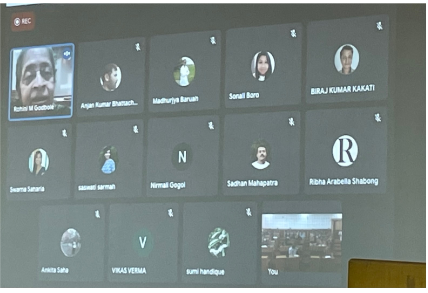-
Title of the events:
121st Birth and 50th Death anniversary of the women rights crusader, Chandraprabha Saikiani on 16th March, 2022
-
Place of event:
Tezpur University
-
Date
2022-03-16
-
Download the report

Event Description
Chandraprabha Saikiani Centre for Women Studies (CSCWS), Tezpur University celebrates 121st birth and 50th death anniversary of the women rights crusader, Chandraprabha Saikiani on 16th March, 2022. 82 number of students participated in the programme.On this auspicious day, the Centre remembers the struggle and sacrifices of Chandraprabha Saikiani who was a torch bearer of women’s movement for equal rights and opportunities. To commemorate this day, the Centre for Women Studies invites Prof. Rohini M. Godbole, Indian Institute of Science, Bangalore and a Padmashri Awardee for an online memorial lecture. The programme was observed in the Academic Council Hall, Tezpur University at 9.30am and continued for an hour. A total of participants benefitted from the programme. The beneficiaries of the programme included students, faculty and the GSAT members of the GATI pilot project.
The event began by offering of floral tribute to Chandraprabha Saikiani. Dr. Madhurima Goswami, Head, CSCWS inaugurated the session and welcomed the esteemed speaker, Prof. Godbole. With due honor and respect, a memento was gifted to the guest speaker who joined the participants online. Dr. Goswami gave a short introduction of Chandraprabha Saikiani and formally started the event.
Prof. Godbole paid her tribute to Chandraprabha Saikiani. She applauded Saikiani’s dedication and strong will to fight for the rights of Assamese women. She found it impressive that when in many other states the first crusader for women’s rights were men, here, in Assam, the torch was lit by a woman herself.
The speaker delivered a talk on “Equity and Inclusion in Science: What role can individuals, institutions and society play?”. She believes that inclusion and diversity can aid in increasing the efficacy of scientific processes by adding more dimensions to the scientific system. Diversity in scientific processes would mean participation of diverse groups, it can be participation of gender diversity, language diversity, socio/economic class, geographical region, physical abilities, knowledge systems. While speaking on how the perspective of a minority or excluded group can add to their respective field of science she tells how their different background, ways of thinking and unique perspective can result in optimal use of humanity’s intellectual potential. Moreover, use of traditional knowledge systems can lead to interesting innovations which can make important contributions to sustainable development goals. Several inventions and important contributions were done by African American women in the US Space Program in 1960. Diversity is in fact beneficial to STEM disciplines ecosystem as it adds dimension and complexity to it. Racial and gender equity should not be seen as correcting a wrong done in history or a charity for some groups. Though Science is universal, and the laws will be same irrespective of the gender of the finder, the areas that one chooses to investigate and the processes that one adopts for it is influenced by their respective gender and race. For instance, Anandibai Joshee who was the first woman doctor from India to get her degree in the USA did her thesis on gynecological problems of women because she herself lost a child at its birth, when she was 14.
There are invisible and unconsciousness bias practiced against excluded groups within the workplace which consequently drains their potential and deprives them of an enabling working environment. Hence, beginnings are tender and crucial. In general, as well, family and career balance is a huge obstacle often faced, especially by women. Women are expected to excel in both home space and the workspace. Therefore, it is necessary to have policies relating to careers after break, flexi-timings, and encouraging young girls to choose science and technology and hold training programs for women studies. However, it is not sufficient. Both institutional changes as well as Change in societal mindset is required. Awareness that it proves to be beneficial not just for the excluded groups but for science in general is also very necessary. This mindset needs to be the part of the ecosystem for equity and inclusivity in science.
Prof. Godbole’s talk was followed by an interaction session where the participants put up their queries, questions and suggestions. It was an interactive and interesting session indeed. The webinar ended with a vote of thanks by the Dr. Goswami, Head of the Department, CSCWS.
Target: Students
Aid: PPT
Impact: The students were able to understand about organizational culture and climate change.


